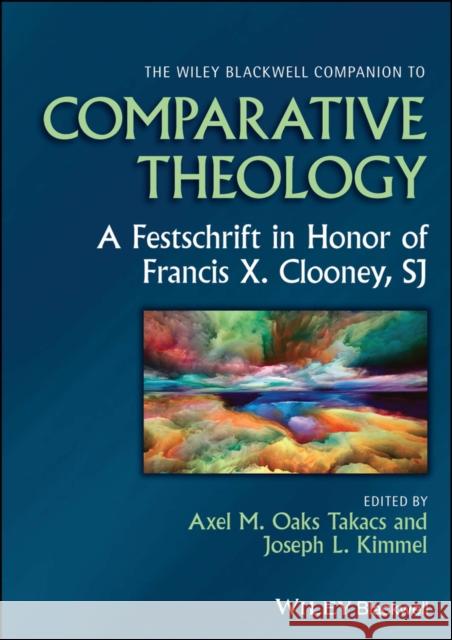The Wiley Blackwell Companion to Comparative Theology: A Festschrift in Honor of Francis X. Clooney, SJ » książka



The Wiley Blackwell Companion to Comparative Theology: A Festschrift in Honor of Francis X. Clooney, SJ
ISBN-13: 9781394160570 / Twarda / 2023 / 700 str.
The Wiley Blackwell Companion to Comparative Theology: A Festschrift in Honor of Francis X. Clooney, SJ
ISBN-13: 9781394160570 / Twarda / 2023 / 700 str.
(netto: 703,25 VAT: 5%)
Najniższa cena z 30 dni: 736,89
ok. 30 dni roboczych
Dostawa w 2026 r.
Darmowa dostawa!
Part I: Theories and Methods in Comparative TheologyChapter 1: Five Insights on Method from Comparative TheologyJason SmithChapter 2: Imagining Religion, Intuiting Comparison: Comparing the Roles of Inner Sense in the Scholarship of Jonathan Z. Smith and Francis X. Clooney, SJJoseph KimmelChapter 3: Resisting Relativism in Comparative TheologyCatherine CornilleChapter 4: Grounding Comparative Theology as Systematic Theology: Beyond Inclusivism and PluralismRuben L.F. HabitoChapter 5: Beyond the Text: Comparative Theology and Oral CulturesNougoutna Norbert Litoing, SJChapter 6: Faith Seeking Understanding or Understanding Seeking FaithBennett DiDente ComerfordChapter 7: Kinesics, Haptics, and Proxemics: A Sakta Method for Comparative TheologyPravina RodriguesPart II: The Spirituality, Vocation, and Formation of the Comparative TheologianChapter 8: 'The one who prays is a (comparative) theologian': The Spirituality of Francis X. Clooney's Comparative MethodChristopher ConwayChapter 9: Settling the Seer: 'Deep Learning' and the Yoga of SlownessMichelle BentsmanChapter 10: Comparative Theology Embodied: The Mentorship, Methodology, and Ministry of Francis X. ClooneyKatie Mahowski MylroieChapter 11: Performance and Negotiation: Reconsidering Religious Experience in Contemporary Comparative TheologyReid B. LocklinChapter 12: A Fowlerian Perspective on the Faith of the ComparativistErik RanstromChapter 13: Comparative Theology as Process Not Conclusion: Francis Clooney on the Proper Formation of the Comparative Theological ReaderJohn J. ThatamanilPart III: Comparative Theology and the Society of JesusChapter 14: Comparing Jesuits: Roberto De Nobili, Henri de Lubac, and Francis X. ClooneyJames FredericksChapter 15: Francis X. Clooney, SJ: Jesuit, Scholar, MissionaryChristian KrokusChapter 16: The Ignatian Tradition and the Intellectual Virtues of the Comparative TheologianPeng YinChapter 17: Wonder Grasps Anything: Punctuation and Patristic Theology in the Early Colonial PhilippinesMaria Cecilia HoltPart IV: Expanding on Francis X. Clooney's CorpusChapter 18: The Interpretation of Scripture in the Comparative Theology of Francis X. ClooneyLeo D. LefebureChapter 19: 'Good dark love birds, will you help?': Comparative Reflections on Clooney's His Hiding Place is DarknessKimberley C. PattonChapter 20: 'Paradoxology:' The Srivaisnava Art of Praising VishnuVasudha NarayananChapter 21: Hymns on Mary in Hindu-Muslim-Christian DialogueKlaus von StoschChapter 22: Mary and Motherhood--A Comparatively-Informed ReconsiderationMara BrechtPart V: Exercises in Comparative TheologyChapter 23: Transformational Liberation in the Age of COVID-19: A Comparative Theology of "the Good Woman"Tracy Sayuki TiemeierChapter 24: And the Angels Wept: How Jewish and Hindu Narratives May Enrich Each OtherArvind SharmaChapter 25: Modification, Emanation, and Parinama-Vada in Mediaeval Theistic Vedanta and KabbalahIthamar TheodorChapter 26: Advancing the Ritual-Liturgical Turn in Comparative Theology: Good Friday as a Case StudyDaniel Joslyn-SiemiatkoskiChapter 27: Creative Fidelity in Expanding the CanonScott Steinkerchner, OP and Martin Badenhorst, OPChapter 28: Slow Reading of Beautiful Writing: Calligraphy as Vehicle for Comparative TheologyLucinda MosherChapter 29: Joy in the Earth: A Christian Cosmology Based on Agapic NondualismJon Paul SydnorChapter 30: Perceiving Divinity, Cultivating Wonder: A Christian-Islamic Comparative Theological Essay on Balthasar's GestaltAxel M. Oaks TakacsChapter 31: Paradoxes of Desire in St. John of the Cross and Solomon ibn Gabirol: Thinking with Poetry in Comparative TheologyLuis Manuel Giron-NegronPart VI: Comparative Theology Beyond the DisciplineChapter 32: "Locating the Self in the Study of Religion: Francis Clooney and the Experiment of Hindu-Christian Studies"Jonathan EdelmannChapter 33: Learning Interreligiously as Public Theology: Limits and Possibilities for Institutional LeadersMichelle Voss RobertsChapter 34: Comparative Theology and Public Theology: In Search of a Responsible Theology for a Post-Secular EraAlbertus Bagus LaksanaChapter 35: God Meets Us There: Prison as True Home for the Christian Comparative TheologianMark J. EdwardsPart VII: The Past, Present, and Future of Comparative TheologyChapter 36: Comparative Theologies Old and New: Exploring the Present of the PastMarianne MoyaertChapter 37: Asking an Unusual Question of Kabir and Kazi Nazrul IslamRachel Fell McDermottChapter 38: Comparative Theology avant la lettre?: A Muslim 'Deep Reading' of the Ramayana in Early Modern South AsiaShankar NairChapter 39: Creativity and Resistance in Comparative Theology: Lessons from 18th-Century KoreaWon-Jae HurChapter 40: In Praise of Artisans: Ramon Marti, Georges Anawati, and the Importance of LanguagesWilhelmus ValkenbergChapter 41: Lectio Divina & Comparative Reading in the History of Christian-Muslim EncountersRita George-TvrtkovicChapter 42: Vicarious Voyage: What Difference Does Comparative Theology Make For Theology?S. Mark HeimChapter 43: Is There or Shall We Need a "Home" for Comparative Theologies? A Ru (Confucian) Response to Francis X. ClooneyBin SongChapter 44: Comparative Theology After ClooneyHugh Nicholson
Axel M. Oaks Takacs is Assistant Professor of Theology and Religious Studies at Molloy University and the Editor-in-Chief of the Journal of Interreligious Studies. He is a comparative theologian and scholar of Islamic Studies and interreligious studies, with an established record of published articles and entries in edited volumes such as the Georgetown Companion to Interreligious Studies, the Brill Companion to Comparative Theology, and Fordham's How To Do Comparative Theology.Joseph L. Kimmel recently completed his PhD in the Study of Religion at Harvard. He teaches part-time at Boston College and serves as an Episcopal priest. In addition to a forthcoming article in the Journal of the American Academy of Religion, he has been published in journals including Biblical Interpretation, the Journal of Interreligious Studies, the International Journal of Culture and Mental Health, and the Graduate Journal of Harvard Divinity School.
1997-2025 DolnySlask.com Agencja Internetowa
KrainaKsiazek.PL - Księgarnia Internetowa









